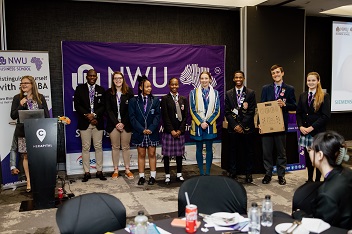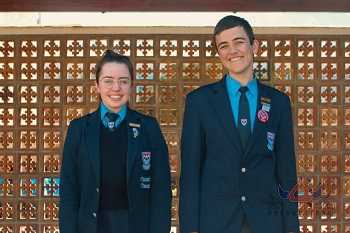On Women’s Day this year, the Business School of the North-West University (NWU) had the privilege of honouring gifted young learners and students with great minds and the potential to shape a better future for all! The Modiragatsi Youth Innovation Competition finalists and winners were celebrated during a breakfast event at The Capital On The Park Hotel in Sandton.
The Modiragatsi Youth Innovation Competition, hosted by the NWU Business School in collaboration with merSETA and SIEMENS, is a community engagement project aimed at empowering the South African youth (especially female youth) to make a tangible difference in their communities.
Applicants, as individuals or in teams of two, are expected to identify a problem in their own community that they think might be resolved by means of a mobile app or an electronic product. They enter with nothing but an idea as a proposed solution and, following that, the 12-week training and mentorship programme is where the magic happens! Learners and students are guided to reposition their view of these real-world problems in a user-centric way by developing their skills in product development, problem-solving through design and computational thinking, mobile app development (using the content of the Mendix university programme) and then building a business around that product. They are also trained in intellectual property protection (using material created by KISH-IP), start-up conceptualisation and pitching to potential investors.
The benefits of the Modiragatsi competition are far-reaching. Firstly, young South Africans are empowered with new skills and given the opportunity to change lives – including their own. We know of learners in the programme whose Mathematics scores in school rose from 1s to 7s as an incidental result of skills learnt in this competition and the fact that, for the first time, they realised that they had reason to believe in themselves. Secondly, learners and students identify and validate problems in their communities themselves, which allow the identification and potential solution of real-world, systemic problems to the benefit of all. Lastly, learners’ and students’ psychological and developmental milestones are gauged and developed. This year, the Care2Kids team of the NWU Centre for Health and Human Performance (CHHP) offered a programme that focuses specifically on learners’ and students’ mental and developmental wellness. This included a weekly personal development live stream for the duration of the competition.
As for the participating innovators themselves, one can only say that the judges were met with remarkable ideas and incredible talent. Overall, 81 teams (150 participants) were trained. From 42 high schools across the country, these teams included 68 high school girls, 36 high school boys and 33 teachers, as well as 13 undergraduate students. To meet the competition criteria, they needed to propose an inspiring idea with the capacity to make an impact when implemented, demonstrate a passion for science and engineering, and communicate the idea clearly, concisely, and appropriately to judges from various backgrounds.
The competition comprises six categories. The first category, Edutech, focuses on the use of technology to improve education. This category boasted six finalists, from whom joint winners were chosen. The idea of the first of the joint winners, Mphoentle Matloa (from Central Secondary School, Brits), was to use physical science to create a science lab in a box for each school. The idea then evolved into creating a digital lab in a box in the form of an app that learners would use to complete science projects. The outcome of the project would be determined by the learner’s input, information would be packaged using physics and the app would include things like quizzes to test users’ knowledge on the content. How’s that for innovative?
The second of the joint winners was the team of Arnold Dippenaar and Isabelle van Wyk (from Hoërskool Waterkloof), who want to create an online platform where learners can participate in Mathematics Olympiads, with the necessary preparation and examples to do so successfully. The idea is to have learners from different educational levels compete and advance to higher leagues. This could be a the much-needed step up in terms of the effective means to “teach” and ensure learner success in Mathematics.
The second category, Food, Energy and Water, had four finalists. The winner, Omphile Choane (from Welkom High School), thought of a way of bringing safe drinking water closer to those in need. His idea was to fit out a bakkie with water purification equipment powered by solar energy. What an exceptional idea! Ayeesha Kahn (from Star College Durban) also received an honourable mention in this category for her idea of bridging the gap between wastage of good food in restaurants and the hungry. This is done by means of an app that enables on-demand sharing of information, which allows for collection and provision of food to those in need. This is a great way to address the food crisis in communities.
In the third category, Gender-Based Violence Prevention, the winner among six finalists was Ritsepile Sambo (from Star College Durban), who proposed a wearable device that one can activate when in a state of panic. This device would effectively collect evidence that the police could use to successfully pursue and prosecute perpetrators. The device would have a recording function, as well as a button to call for help.
The winner of the fourth category, Healthtech, was the team of Kevin Naylor and Jo Duvenhage (from Worcester Gimnasium). They want to develop a digital platform where teens can safely and anonymously share mental health-related questions and problems without feeling exposed. This not only provides a safe space for teens to talk and get help, but it also allows counsellors to identify and address systemic problems among the youth. Isn’t this platform exactly what our youth need to achieve and maintain wellness in this day and age?
In the Safety and Security category, winner Tyla Shepstone (from Somerset College) thought of using the internet to better manage and prevent cases of missing persons. This not only includes the tracking of children, but also the identification of “green zones”, meaning routes where children generally move, and then creating an alert whenever these zones are deviated from. Since one cannot be careful enough when it comes to the safety of loved ones and oneself, it would be modest to say that this is a brilliant idea.
The final category, Township Economy, had three finalists whose projects coincidentally complemented one another so well that it would make for an incredible business. The category winner, the team of Martin Maupa and Lenke Ernst (from the North-West University), proposed an innovative app that would act as an economic tool to create greater market access for small to medium enterprises in townships to formalise their business ideas. What a substantial need among these businesses, and what a way to meet it!
Choosing the ultimate winner among such remarkable ideas was a nearly impossible task. The judges were astonished at what these learners were capable of with nothing but the gift of their own minds. With no technical experience whatsoever, competitors came with just an idea, and with 12 weeks of stimulation in a structured programme, these ideas were transformed into relevant, innovative, implementable initiatives that address real-world problems. After much deliberation, the team of Kevin Naylor and Jo Duvenhage (from Worcester Gimnasium) walked away as ultimate prize-winners, with their exceptional idea of a mental health communication platform for teens. The grand prize includes a bursary for these learners to study at a South African university. The winners will also be visiting Germany in December 2022 on a technology tour, facilitated by SIEMENS Digital Industries. “It is nothing less than an absolute privilege to be partnered with SIEMENS, as they open doors in industry to our winners that hundreds of engineers can only dream to access. This truly is a once-in-a-lifetime opportunity,” said Prof Leenta Grobler.
The success of this competition and of each participant is both exciting and humbling, and a cornerstone of this that cannot be left unmentioned is the incredible mentorship of the teachers, whose dedication went above and beyond all expectations. A single example is the KZN floods in June, which could have direly impacted learners from Durban Star College in the competition. This impact was warded off by teachers who called times without count to ensure that learners knew what was expected of them and did not miss a thing. Their hands-on involvement in every step of this competition made all the difference and, against the odds, thanks to these teachers, Star College Durban proudly had two category winners in GBV and the Food, Energy and Water categories. The same can be said for teachers like Grace Djan from the Potchefstroom High School for Girls, who mentored 14 teams and did the interviews with each finalist team herself. No task was too much trouble for this teacher, who gave her all to see her learners thrive in the competition.

Category winners, 2022

Ultimate winners Kevin Naylor and Jo Duvenhage (from Worcester Gimnasium)
